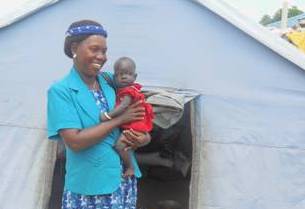Harriet Baka is a familiar and welcome sight in Lologo 2, a camp for internally displaced people on the outskirts of Juba, South Sudan’s capital city. “Mama Harriet”, as she is fondly known, has been visiting the community, mostly women and children, since they fled intense violence in Bor in early 2014.
Provincial coordinator of the Mothers’ Union in South Sudan and Sudan, she also is part of ECSSS’s Emergency Crisis Committee. The Committee has responded to the humanitarian crisis that unfolded following the outbreak of armed conflict in South Sudan in December 2013 as a result of a political dispute.
In the face of the displacement of 1.5 million people internally and nearly half a million refugees fleeing to neighbouring countries, Harriet has helped to identify areas most in need of assistance, drawing on her network of diocesan Mothers’ Union coordinators around the country.
By training local distribution teams, Harriet has ensured that essential food rations reach the most vulnerable – women, children, the elderly and people with disabilities – even in remote areas where access has been hampered by ongoing conflict and flooding. Difficult terrain, long days and fatigue have not stopped her determination to help those in need.
This drive to serve the most vulnerable doesn’t end with making sure people receive the basic essentials.
Conscious that being displaced often means being robbed of the income and dignity of a livelihood, she has set up catering, dressmaking and farming projects in the Bor area. News of these income-generating activities has filtered back to the women in Lologo 2 camp, giving them the confidence to return home and start anew.
Internationally, the Mothers’ Union, along with other Anglican churches and agencies around the Communion, has supported this work through prayer and practical assistance, coming together through the Anglican Alliance.
Harriet’s work since the crisis is a seamless continuation of years of struggle to improve the situation of women in South Sudan and Sudan through literacy, entrepreneurial and other kinds of training, and human rights advocacy.
This also has taken the form of efforts to build up democratic civil society. During the run-up to the vote on independence in 2011, Harriet was involved in voter education training and election observing through the Sudanese Network for Democratic Elections and serves as treasurer for the network, the largest of its kind in the country with some 75 members.
She continues to work with others, particularly with women, to bring the peace to South Sudan that is so sorely needed for development initiatives to be sustainable.
In June of 2014 Harriet joined a CAPA (Council of Anglican Provinces in Africa) consultation with women delegates from ten Anglican provinces in Africa condemning the widespread poverty and lack of peace and security in many African countries. The women urged leaders to ensure peaceful coexistence and pledged to make a solidarity visit to the ECSSS as a sign of their peace-building commitment.
On International Women’s Day 2015, she, together with women from the ECSSS, spoke out against ongoing tribalism and violence and called on all the women of South Sudan “to forge a common agenda for peace”.
The Anglican Alliance nominated the Episcopalian for the Humanitarian award.
“Harriet works selflessly to bring relief and dignity under very difficult conditions,” said Anglican Alliance Co-Director Rachel Carnegie. “She is an inspiration to many others who work alongside her in South Sudan and across the Communion. Personally, it has been a privilege to get to know her and to accompany her and her colleagues from the ECSSS Emergency Crisis Committee on visits to the IDP communities.”
The Humanitarian Award is one of four awards conferred annually by Bond, a UK body of NGOs active in international development. It recognises inspiring individuals working on the frontline in some of the most challenging contexts around the world. 13 individuals were shortlisted for the 2015 Humanitarian Award.
The 2015 Bond Awards were conferred on 1 June at King’s Place, London. Although Harriet did not end up on the award platform, being shortlisted was a superb recognition of her work.
The Anglican Alliance has provided a platform to help connect and coordinate the support from the Anglican Communion through ECSSS’s Emergency Crisis Committee and SUDRA, the relief and development arm.
Photo: Anglican Alliance. Harriet Baka holds a child in an IDP camp outside Juba

